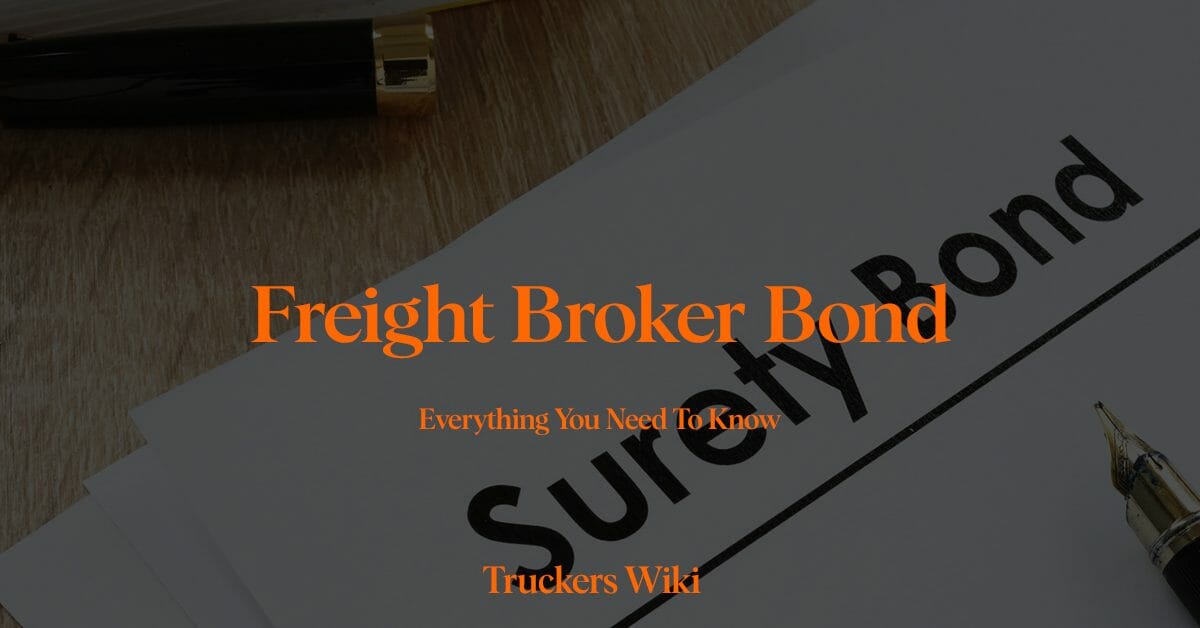
Table of Contents
What is a Freight Broker Bond
A freight broker bond, known as BMC-84 bond, is a type of surety bond required by the FMCSA for freight brokers and forwarders. It ensures that brokers and forwarders adhere to contractual obligations and industry regulations, offering financial protection to carriers and shippers against potential broker misconduct.
Learn more about Broker here.
Requirements and Process
To operate legally, freight brokers in the U.S. must possess a broker bond.
Here’s a brief overview of the requirements.
Bond Amount
As of the MAP-21 Act, the bond amount was increased to $75,000, ensuring better protection for motor carriers and shippers.
Application Process
Brokers need to apply through surety bond companies or agents. Factors such as credit score, financial stability, and industry experience can influence bond premiums.
Renewal and Claims
The broker bond is typically renewed annually. In the event of a broker’s default, carriers or shippers can make claims against the bond.
How Long is The Freight Broker Surety Bond Valid For
The bond is typically valid for one year from the issuance date. It must be renewed annually for the freight broker to maintain their active broker authority with the Federal Motor Carrier Safety Administration (FMCSA).
If a broker fails to renew their bond or maintain an active bond, they risk losing their broker authority.
If the broker or surety company wishes to cancel the bond, the surety company must provide a 30 day cancellation notice to the FMCSA.
Surety Bond Renewal Process
Check the Expiration Date
Start Early: Begin the renewal process well in advance of your bond’s expiration date. This gives ample time to address any unforeseen issues.
Review Documents: Your bond provider should send a renewal notice, but it’s always good to keep track independently.
Assess Financial Health
Credit Score: Your credit score plays a significant role in determining your bond premium. Ensure you have a decent credit score for favorable terms.
Financial Statements: Keep your financial statements updated. Strong financials can lead to lower premiums.
Contact Your Surety Bond Provider
Initiate Renewal: Reach out to your bond provider to start the renewal process. Many providers have online systems to streamline this.
Discuss Premium: Based on your current business health and credit score, discuss the renewal premium. Negotiate if necessary.
Review Bond Amount
FMCSA Requirements: The FMCSA mandates a bond amount of $75,000 for most brokers. Ensure you’re compliant with this requirement.
Evaluate Business Needs: While $75,000 is the minimum, if you’re brokering higher-value loads or wish to increase trust with carriers, consider a higher bond amount.
Complete the Renewal Application
Provide Information: Fill out all requested information on the renewal application. This typically includes business details, financials, and other relevant data.
Accuracy is Key: Ensure all details are accurate to prevent any delays or issues.
Pay the Premium
Payment Options: Most providers offer multiple payment options, including online payments, checks, or wire transfers.
Partial Payments: Some providers may allow for installment payments or financing options, especially if the premium has increased.
Receive Your Renewed Bond
Digital and Hard Copies: Once the process is complete, you’ll receive your renewed bond, often both digitally and as a hard copy.
Safe Storage: Store the bond in a safe place, and keep digital backups as well.
Update the FMCSA (if required)
In most cases, your bond provider will electronically update the FMCSA about your renewed bond. However, it’s a good practice to check and ensure the FMCSA’s records reflect your active bond status.
Set Reminders for the Next Renewal
Stay Proactive: Set calendar reminders for the next renewal to avoid any last-minute rush.
Annual Review: Make it a practice to review your bond needs annually, considering any changes in your business or the industry.
The Purpose of the Broker Bond
Protection for Carriers and Shippers
The broker bond serves as a form of insurance, ensuring that carriers and shippers are paid for their services even if the freight broker fails to meet their financial obligations.
Encouraging Ethical Behavior
The bond acts as a deterrent for fraudulent activities, compelling brokers to operate within the set industry standards and guidelines.
Enhancing Industry Trust
By ensuring that brokers have the means to cover potential financial losses, the bond builds trust between brokers, shippers, and carriers.
Background and History
The requirement for freight brokers to obtain a bond originated with the “Interstate Commerce Commission Termination Act of 1995.” However, the Moving Ahead for Progress in the 21st Century Act (MAP-21) in 2012 increased the bond amount, reinforcing the importance of financial security in the freight brokerage sector.
[Links at the bottom of the page]
Impact on the Trucking Industry
The broker bond has brought about significant positive changes in the trucking industry:
Reduced Defaults
With a higher bond amount, instances of brokers defaulting on payments have seen a decline.
Regulation Compliance
The bond mandates brokers to adhere to Federal Motor Carrier Safety Administration (FMCSA) regulations, fostering a more regulated and structured industry environment.
Increased Transparency
The presence of a bond adds a layer of transparency to broker operations, enhancing overall industry operations.
Challenges and Criticisms
While the broker bond is pivotal, it’s not devoid of challenges:
Higher Entry Barriers for New Brokers
The increased bond amount can pose a significant barrier to entry for budding brokers with limited capital.
Potential for Misuse
Unscrupulous individuals may misuse the bond’s concept to create a false sense of security among carriers and shippers.

